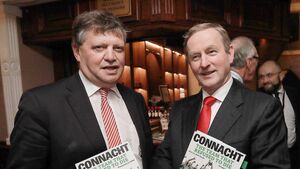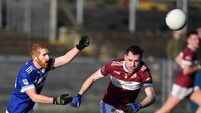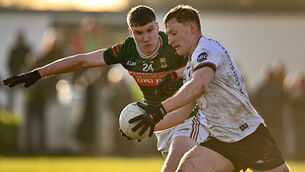GAA and politics can no longer co-exist at the one time

John O'Mahony, who became a TD during his second spell as Mayo manager, and An Taoiseach Enda Kenny whose father Henry was also a TD having featured on the first Mayo team to win the All-Ireland SFC in 1936. Picture: INPHO/Donall Farmer
Justin McNulty’s recent conundrum will have been levitating on his horizon for a while – like the dark cloud threateningly approaching a full clothes line. And while it took a while to reach that point, it had become entirely unavoidable. Last November, the SDLP revealed that it had given the Newry and South Down MLA permission to carry out his duties as Laois GAA football manager, but only when the Assembly was not sitting. And that didn't pose any issues at the time. The DUP had collapsed Stormont back in spring 2022 and the volatile political discourse in Northern Ireland was showing few signs of evolving into a fully-functioning democracy. McNulty was free to spend his time as he pleased without consequence.
The former All-Ireland-winning Armagh footballer was nevertheless informed that he would have to decide between his duties as a politician and an inter-county football manager once the Northern Ireland Assembly got back up and running. That day arrived earlier this month as the DUP returned to Stormont and allowed a nationalist politician, Sinn Féin’s Michelle O’Neill, to be elected as First Minister for the first time.
But before the historic day played out, McNulty stepped away and set off for his side's Division Four clash with Wexford. Like McNulty, the SDLP knew this day was coming and were forced into action, perhaps feeling that anything short of suspending McNulty would be rightly viewed as hypocritical. For the last two years, SDLP leadership had been venting their frustration with the DUP. They argued that they were elected to work in Stormont and were failing to carry out their civic duties while still receiving taxpayer money. Surely the same rule would apply to their own members, the party will have felt, regardless of obligations to a GAA team.
The intersection between GAA and politics is a large one that goes back all the way to the foundation of the state. And for most of the last century, the relationship has been stable and unburdened by politicians’ obligations elsewhere.
Austin Stack, one of Éamon de Valera’s key lieutenants in Anti Treaty Sinn Féin, captained Kerry to All-Ireland glory in 1904 before he eventually became heavily involved in the IRA's campaign for independence over the following years. Meanwhile, the lesser-known Daniel O'Rourke played inter-county football for Roscommon. He began his political career as a national politician in the Mayo South-Roscommon South constituency, before subsequently becoming heavily involved in the administration side of GAA affairs and becoming President of the association in the late 1940s.
That link between politics and GAA is evident throughout the country, with Mayo being a notable hotspot. Current TD Alan Dillon is by no means a trendsetter in this regard. Members of every All Ireland-winning Mayo team have gone from kicking ball in Croke Park to oratory in the Dáil: the 1936 team had Henry Kenny, father of former Taoiseach Enda Kenny, while captain of the 1950 and 1951 teams Sean Flanagan famously pursued the same route. John O'Mahony, who also played for Mayo though who is perhaps best known for his success on the sideline, also eventually entered the national political arena in the mid-noughties. And Achill native Denis Gallagher, who served as Minister for the Gaeltacht, also served as chairman of Mayo GAA. Political imprints are visible across every branch of the GAA.
Those ties continue to be exceedingly strong today. Indeed, the Wexford manager who shared a sideline with McNulty earlier this month, John Hegarty, is the mayor of Wexford Town.
But combining careers in politics and the GAA has become a delicate balancing act that is becoming increasingly incompatible. That's certainly the case for GAA management.
O'Mahony is probably the most well-known example of a politician who juggled both jobs at once. He did so just as the role of inter-county manager was evolving into the all-encompassing full-time career it has become today. During O'Mahony's stint with Mayo, Louth TD Peter Fitzpatrick also became a national politician while he was manager of Louth. He had been successful with the county too, leading them to their first Leinster final since 1960 which they subsequently lost in controversial circumstances. Despite that relative success, the newly-elected Louth TD felt compelled to step down from his role on the sideline within a year of being elected to Leinster House.
Despite the clear challenges that exist, Limerick manager John Kiely is also flirting with the idea of entering the political arena, refusing to rule out such a move when he was quizzed on the subject late last year.
“Some people have asked, but they haven't gotten an answer,” he admitted in response to intense speculation regarding his political aspirations. “Lots have asked; who knows what’s down the road, and hopefully opportunities will come my way.
“I’ll assess them as they come and, hopefully, I’ll make the right decision for me and for whatever organisation that might be.” But the Limerick manager is unlikely to make that step until he moves on from the dynasty he has created with the Limerick hurlers, even though a Limerick mayor is due to be directly elected by public for the first time this June.
GAA management has become an immense commitment even for those who aren't in the bubbling cauldron of national or regional politics in the 21st century. The GAA inter-county manager has become a role for a person that can dedicate 100% of their time to the role or who can at least dictate his own hours. In Division One alone, Kevin McStay, Jack O'Connor and Mickey Harte have all retired from their careers, which allows them to concentrate on managing their respective careers with Mayo, Kerry and Derry respectively. That trend will likely only grow over the coming years.
It's an unforgiving pursuit that dominates all aspects of a life. It's not unusual for a GAA manager to turn up for training a few hours early a couple of times a week to plan and ensure everything a team needs is provided. And the GAA inter-county season extends across most of the calendar. The manager of an inter-county team has essentially become the CEO of a modest-sized organisation comprising of dozens of players and backroom team members.
The McNulty debacle has proved what many had already assumed to be true – careers in GAA and politics can no longer co-exist at the one time. The intersection is beginning to contract.




